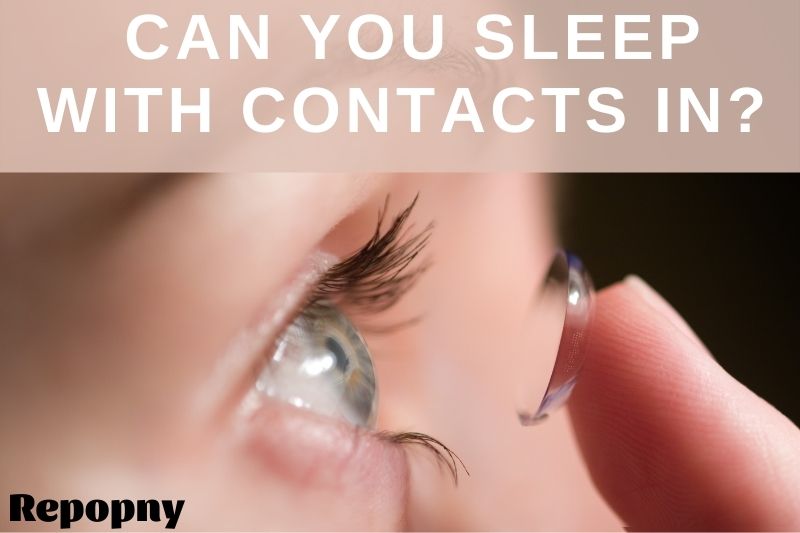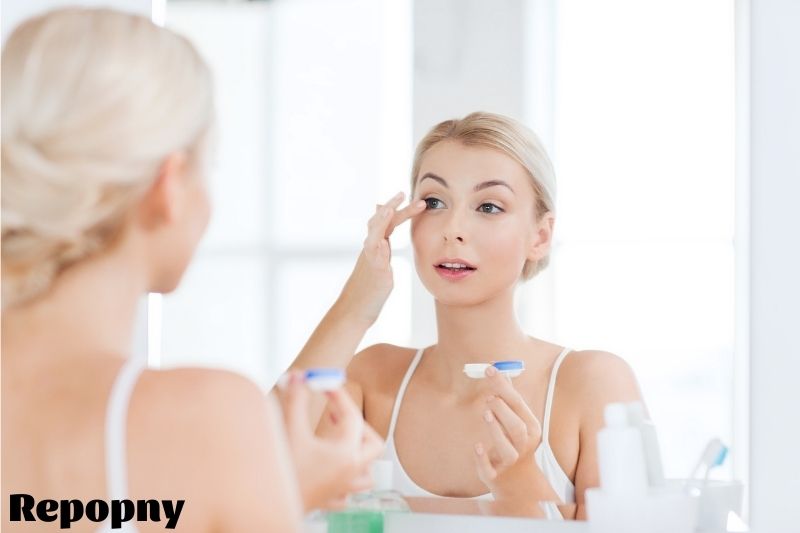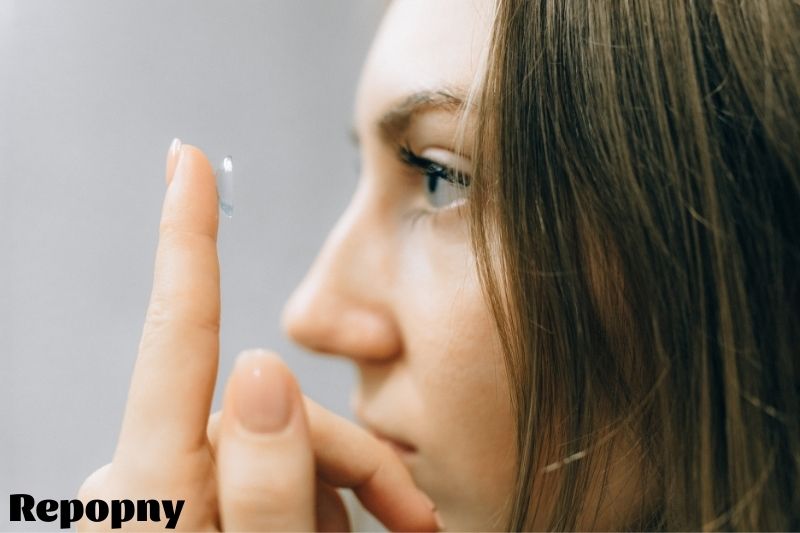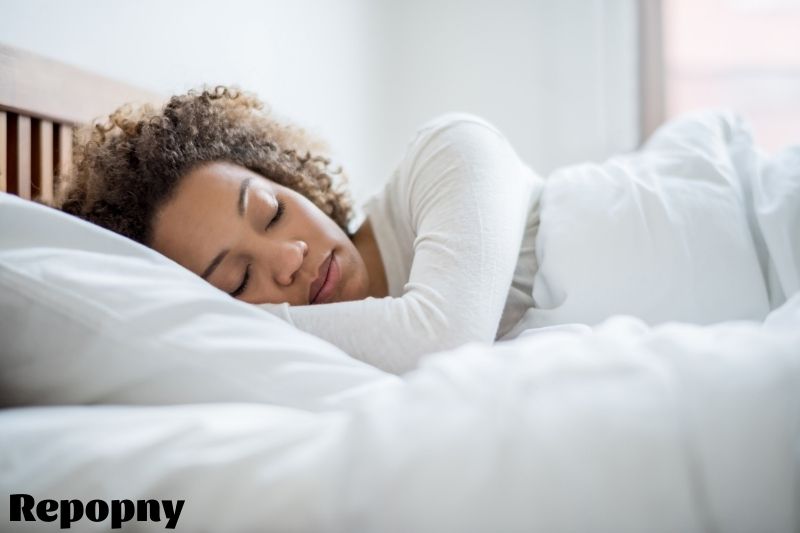- Repopny
Contacts are a great way to improve your vision, but can you sleep with contacts in? It turns out that you can, but there are a few things you need to know first.
In this article, Repopny will talk about the main problem with wearing contacts overnight and the solutions to these problems.
Contents
- 1 Are Contact Lenses Safe To Wear While Sleeping?
- 2 What Happens If You Sleep In Contact Lenses?
- 3 Canthamoeba Keratitis
- 4 Fungal Keratitis
- 5 How Does Sleeping With Contacts Increase The Chances Of Getting An Eye Infection?
- 6 What Happens If I Sleep With My Contacts In?
- 7 Can You Take A Nap While Wearing Contact Lenses?
- 8 How To Wear Contact Lenses Safely
- 9 FAQs
- 10 Conclusion
Are Contact Lenses Safe To Wear While Sleeping?
Sleeping with contact lenses is not recommended. Sleeping with contacts, according to specialists, increases your risk of developing a corneal infection, which is an infection of the transparent layer that protects the colored area of your eye.
When you wear your contact overnight, your chances of developing microbial keratitis, an infection-induced ocular irritation, increase by more than five times. Regardless of whether you use soft, hard, ornamental, or prescription lenses, this danger exists. Unfortunately, sleeping with contacts is a regular occurrence among both teenage and adult contact lens wearers.
In addition, sleeping in your contacts occasionally or unintentionally can raise your risk of infection. According to research, even lenses that are certified for overnight or extended usage should not be worn while sleeping.
You’ve undoubtedly fallen asleep with your contacts once or twice if you’re like one-third of contact wearers. You may have awoken with a dry feeling in your eyes.
However, sleeping with your contacts increases your chances of getting an eye infection six to eight times. Learn why sleeping with contacts increases your risk of disease, the different conditions that might arise, and what to do if you wake up with contacts in your eyes.
What Happens If You Sleep In Contact Lenses?
When you sleep with your contacts in, your chances of getting an eye infection skyrocket. These infections can result in permanent corneal damage and visual loss under challenging situations.
Bacterial Keratitis
If not treated appropriately, bacterial keratitis, or an inflamed cornea caused by bacterial infection, can cause a person to lose part or all of their vision.
Wearing contact increases your chances of getting this infection, mainly if you use them overnight. Bacteria such as Pseudomonas aeruginosa and Staphylococcus aureus, which can be found in soil, water, and your body, can cause bacterial illnesses.
Bacterial keratitis can develop when bacteria is introduced to your lenses through your fingers when you insert or remove your contacts. If the lenses or storage case have not been adequately cleaned and disinfected, the germs can spread. Using water instead of contact solution to rinse your lenses can potentially raise your risk of bacterial keratitis.
Canthamoeba Keratitis
Ancanthamoeba keratitis, or corneal inflammation induced by an amoeba infection, can cause vision loss or blindness. Acanthamoeba, a microscopic single-celled organism found in natural bodies of water, soil, tap water, heating and air conditioning systems, and hot tubs, cause this form of illness.
People who wear contact lenses are more likely to get Ancanthamoeba keratitis, with contact lens wearers accounting for 85 percent of those who develop the inflammation. Contact lens hygiene issues, such as swimming or showering while wearing contacts, raise your risk.
This infection can occur if you have a scrape in your eye, which can occur due to an injury or regular contact lens use, and the organism enters the grating by water or contact lens solution.
Ancanthamoeba keratitis can be exacerbated if you sleep in your contact lenses overnight. It restricts the quantity of oxygen available to your cornea, impairing its capacity to protect itself from bacteria.
Fungal Keratitis
Fungal Keratitis is a type of keratitis caused by fungi
When left untreated, fungal keratitis, or corneal inflammation caused by a fungal infection, can result in vision loss or blindness. Fungi from the Fusarium, Aspergillus, and Candida species are frequently responsible for fungal keratitis. This infection is more frequent in tropical areas of the world, although it can occur anywhere.
Antifungal medication is usually used to treat fungal keratitis, but more severe cases may require surgery or a corneal transplant. Wearing contact lenses and having an eye injury caused by a plant, such as a stick or a thorn, is a risk factor.
How Does Sleeping With Contacts Increase The Chances Of Getting An Eye Infection?
Your eyes regularly contact a wide variety of bacteria and microbes, but thanks to the protection offered by your tears, you can avoid infection. You keep your cornea healthy by blinking throughout the day and introducing new tear fluid and fresh oxygen into your eyes.
On the other hand, it fit firmly over your cornea and block out much of the tear fluid. This makes it more difficult for your cornea to fight microorganisms or remove them from underneath your contact lens. Your corneas receive even less tear fluid because you are not blinking when you sleep with contacts in. As a result, tears are less likely to get underneath your lenses and mix with the fluid beneath them.
The amount of oxygen8 that enters your cornea is dramatically reduced when you sleep with your contacts or wear them for a lengthy period. This can also harm the surface of your cornea, reducing its ability to grow new cells and raising your risk of infection. Bacteria have more time to develop into an illness if your contacts are worn overnight.
Soft contact lenses are meant to be more flexible and allow more oxygen to reach the cornea and are worn by about nine out of ten contact lens wearers. However, regardless of lens type, wearing contact while sleeping increases infection by fivefold.
What Happens If I Sleep With My Contacts In?
Even if you don’t want to sleep with your contacts in, you may doze off before removing them occasionally. It’s critical to remove your contacts as soon as possible after waking up. First, make sure they’re easy to remove. Do not pull on them if they are trapped. Instead, put eye drops in your eyes and blink until they’re gone.
Then take a break from looking at it. Avoid using contacts for at least a day and pay special attention to how your eyes feel. Stop wearing your lenses and contact your eye doctor right away if you experience any symptoms of infection. Bring your contact lenses to your appointment in their case.
Indications That You Might Have An Eye Infection
The following are signs that you may have an eye infection:
- Vision is blurry.
- discharge from the eyes
- Redness in the eyes
- Eye discomfort or agony
- a lot of tearing up
- Light Sensitivity Swelling
- Eyes that are itchy or stinging
Can You Take A Nap While Wearing Contact Lenses?
Even if you’re only napping, it’s not a good idea to sleep with contacts on. An infection can be increased by taking an occasional or unintentional nap in your contacts. Remove them first if you believe you might fall asleep while wearing your contact lenses.
How To Wear Contact Lenses Safely
While sleeping is beneficial to your health, sleeping with your contacts increases your chance of infection. Wear your contacts just when you are awake to protect your eyes. Maintain good contact lens hygiene as well. Following these steps will help you avoid getting an eye infection:
- Clean and disinfect your lenses according to the manufacturer’s instructions.
- After using lenses, always throw away any leftover solution. Do not add a new solution to the existing solution in your contact lens case.
- Do not expose your lenses to any water or saliva.
- Remove your contact lenses when swimming or entering a pool, hot tub, lake, or ocean.
- Replace your storage case every three months or as directed by your eye doctor.
- It is not good to transfer your contact lens solution into another container when traveling because it is not sterile. Instead, choose travel-sized options.
It’s also crucial to see your eye doctor once a year. Even if your contact lenses are only cosmetic and do not impact your vision, you should still receive a prescription for them. It sold without a prescription are illegal and potentially dangerous. A doctor’s appointment allows you to discuss the safest approach to use and maintain contact with your doctor.
FAQs
What is the maximum time I may leave my contact lenses overnight?
A one-hour nap will not damage you. When you go to bed at night, though, you should remove your contact lenses.
Who says you can’t sleep with your contacts in?
If you have sensitive or dry eyes, always take your contact lenses before going to bed (even with extended-wear lenses). If you must have the lenses stay in your eyes overnight, we recommend consulting with an ophthalmologist.
When I wake up, my lenses are no longer in my eyes. What should I do?
It is anatomically impossible for contact lenses to slip behind the eye. If you can’t find your contact lens, stand in front of a mirror and look for it. It’s most likely just slid off to the side.
When should I take out my lenses if I haven’t taken them out yet?
As soon as you wake up, remove your contact lenses to allow the lens to become moist and soften, as mentioned above.
Video
Related post:
Conclusion
It is generally not recommended to sleep with contacts in, as this can increase the risk of eye infection. Sleeping with contacts can also cause discomfort and make it more difficult to remove the lenses in the morning. If you must sleep with contacts in, clean them thoroughly before bed and follow all other safety precautions.






